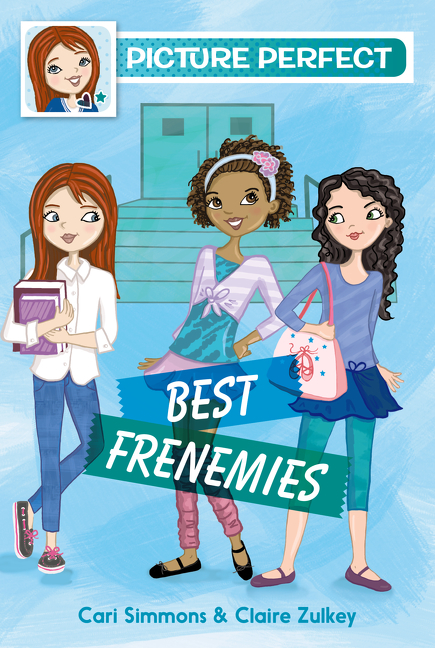I was excited this week to see that the middle-grade novel I worked on that's coming out in April has a cover:

Some of you may wonder who Cari Simmons is. I've never met her in real life, but she provided the synopses for the books in the "Picture Perfect" series. I received the outline for "Best Frenemies" and then filled it all out to 40,000 words with my details, descriptions and jokes, both inside and not. I love seeing the book's cover because it was me who decided what (from left to right) what Alice, Cassidy, and Nikki look like, so it tickles me to actually see them rendered on a book cover. I hope lots of young folks take a look at it and decide that they want to check out this particular friendship tale. I think it's lots of fun--and it's set on the North Shore, where I grew up, so anyone from there will, I hope, like the shout outs to the lake and Walker Brothers and what have you.
Anyway, someone once asked me, using finger quotations, if I ever planned on publishing a "real" novel, because clearly books for young people are things that don't really exist and require no effort. The plain truth of the matter is that, since An Off Year, I've written three or four completed novels, both "real" (for adults) and not, but none of them have been good enough to get published (even I know this now, although I might not have wanted to admit it right after I'd actually written them.) This is discouraging, but I keep trying, because I'm an idiot or inspiring or both. I started a new one in January but it has stalled in the last few months, both due to me being busy and just sort of losing my track and focus and excitement. Time away from the book has been good, though, to get some space, especially because this weekend I'm going to have forced time with the book. Some writer girlfriends and I are getting away to a house in Wisconsin to make ourselves to write on an informal writers' retreat. I'm excited and hope I can get some good work done.
I've done some light research on the book in my months off and thought in general about my main character and what motivates her and how that will be reflected in the beginning and end of the book. But one of my problems is lack of organization when it comes to book writing. What I loved about working on "Best Frenemies" was that I was given an outline, so I didn't have to worry about what would happen, or when. I find coming up with one myself very challenging. Especially once I've written 80 or so pages and am trying to take a critical look, I will often will dive into my book and feel pleased with the beginning that I wrote while I was all inspired, and then get tired and disorganized and discouraged as I get further in and see how many holes and questions and placeholders I have set up for myself, the scenes that I wrote before that I know now don't work. I find it all very hard. It makes me feel like a dumb faker.
Anyway, for the writers out there, I'm curious about what experience you have when it comes to getting back into a partially-finished project. Do you start from the beginning, or do you dive into the spots you know you can fix right now? Do you spend time teasing out the order in which things happen so you have a road map, or do you write it out and figure that out later? Any tips you may have on how I can get the most out of this time to write and actually use it well, instead of stalling and feeling helpless will help. If that's even possible.

Kelly
Here's what I do: I trick myself into thinking I'm the ghostwriter who has been hired to fix the manuscript because the author got in over her head. Or I say to myself, "well, obviously, I am NOT writing this because it is a hot mess, but if I WERE going to write it, I mean, just for pretend, I would probably do it like..." And then I make a "fake" outline and then write "fake" chapters. And it doesn't matter if they're any good because no one's ever going to see it anyway, since it's all just pretend. And in the end you have a book. This has worked three times for me so far.
Also: I am definitely an outliner. Everyone is different on this question, but for me an outline helps me avoid falling into despair when I don't know what's coming next. You can always change the outline, of course, if it's not working, but at least you have something to aim for. With each book, I have spent more time on the outline up front, and it has helped me in the drafting phase. Outlining is not, IMHO, wasting time or procrastinating, because you truly are troubleshooting in advance. Screenwriters do everything this way. And sometimes revision on a half-finished something is the best time for an outline. Because it gives you the bird's-eye view of what you have, what's working, what's undercooked, etc.
Blair Koenig replied to comment from Kelly
Great comment, Kelly! Good tips.